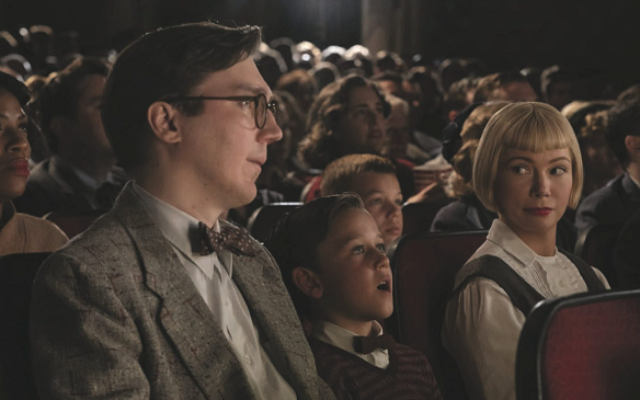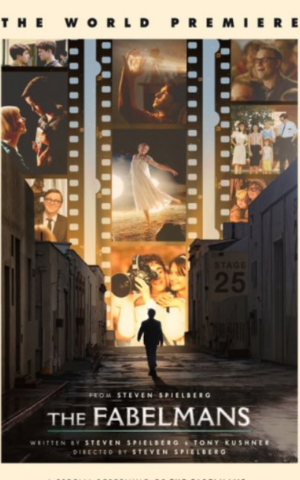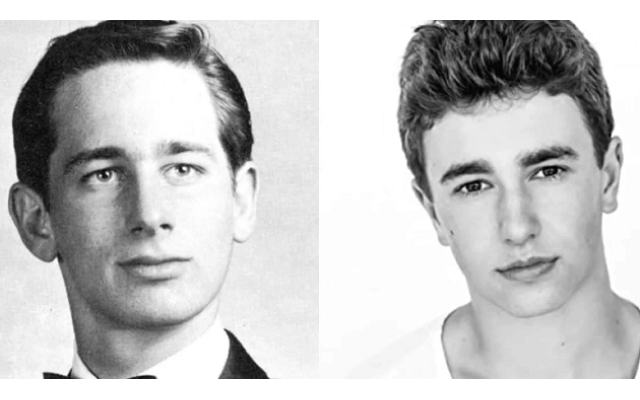New Film Depicts Steven Spielberg’s Early Years
'The Fabelmans' is based on the director's own childhood in suburban Arizona in the 1950s.

“The Fabelmans,” said to be Steven Spielberg’s most personal film and perhaps his most intimate examination of American Jewish life, premiered at the Toronto International Film Festival Saturday, Sept. 10. The film is based on Spielberg’s own childhood in suburban Arizona in the 1950s.
The young Canadian-born actor, Gabriel LaBelle, plays Sammy Fabelman, who, much like the young Spielberg himself, aspires to be a Hollywood director. His father is portrayed by Paul Dano and his mother, with whom, in real life, he had an exceptionally close relationship, is played by four-time Academy Award-nominee Michelle Williams. Rounding out the cast is Seth Rogan as one of his father’s co-workers and Judd Hirsch as a favored Uncle Boris.
The coming-of-age drama, which was not only directed and produced by Spielberg, but was also co-written by him, follows the young filmmaker’s early infatuation with the world of moviemaking. Eventually, it leads to his first film, a production he enlists the neighborhood in backing. Along the way he experiences the bumps and upsets in family life that give the film its texture and emotional heart.
In the film’s setting — the suburbs of the American West — and in its main character, a young Jewish boy who does not quite fit in, Spielberg’s latest production may echo his 1982 success, “E.T. the Extra-Terrestrial.”

Spielberg is quoted as calling it “a broad-based story about an ugly duckling, someone who didn’t belong. Someone who wasn’t like anyone else. And because ET wasn’t like anyone else, he was picked apart and almost died. I always felt ET was a minority story … that stands for every minority in this country.” Including, presumably, the Jewish minority with which Spielberg has so strongly identified during so much of his adult life.
As Joseph McBride, Spielberg’s biographer put it, “as a pencil-necked geek with a huge head, big eyes and nose, and protruding ears, the younger Spielberg could have passed as a human cousin to E.T., whom he described as ‘a creature only a mother could love.’”
In reality, Arizona, where Spielberg lived between the ages of nine and sixteen, was among the most challenging experiences of his young life. As the eminent film critic Molly Haskell relates in her book for the Jewish Lives book series from Yale University Press, Spielberg was a consummate outsider. Newly arrived from New Jersey, “he felt more like an outsider than ever, ‘a wimp in a world of jocks.’ … Bullies called him ‘Spielbug.’”
But Arizona also became a place where the future director found himself, particularly when his father gave him his first Kodak Brownie still camera and, later, an 8 mm movie camera that had been a gift from a friend. Almost from the start, he became a filmmaker with a knack for telling simple stories, almost intuitively, with an emphasis on action and excitement.
It became a convenient distraction for his lack of acceptance at school and for the tension that existed between his feuding parents at home. Eventually it would lead to his first film, “Gunfight,” a nine-minute Western that he made for his Boy Scout photography merit badge. It would eventually be followed by “Fighter Squad,” a film that he spent three years making, and which debuted to much local acclaim when he was 16. As Haskell relates, “shot with six cameras, incorporating stock footage and using the actual plane that Arnold (his father) had somehow managed to obtain, the movie was a dazzling action display.”
The new poster for “The Fabelmans,” which was released just before the film’s premier in Toronto, hints at some of this backstory. It features the silhouette of a child walking down a cobblestone street, with a large sign reading Stage 25 hanging overhead. Arrayed in the background are scenes from “The Fabelmans,” featuring the main character and the young Sammy with a camera in his hands.

The production is not the only film with a Jewish theme that Amblin, Spielberg’s production company, has under development. Last month, Marlee Matlin, the Jewish American actress and Academy Award-winner, announced that she was partnering with Amblin TV to develop a new limited series, “Signs of Survival: A Memoir of the Holocaust.”
Spielberg’s production company and Universal are putting a considerable promotion budget behind “The Fabelmans.” It is expected to be a popular offering during the year-end movie-going season.
The film will make its American debut as the closing night presentation at the American Film Institute’s AFI Fest 2022 on Nov. 6. It is scheduled to arrive in American theaters on Nov. 23, just in time for Thanksgiving.
- Arts and Culture
- film
- Opinion
- Steven Spielberg
- The Fabelmans
- Toronto International Film Festival
- Gabriel LaBelle
- Paul Dano
- Michelle Williams
- Judd Hirsch
- seth rogan
- coming-of-age
- American West
- E.T. the Extra-Terrestrial
- Joseph McBride
- Yale University Press
- Kodak Brownie still camera
- Boy Scout
- American Film Institute



comments